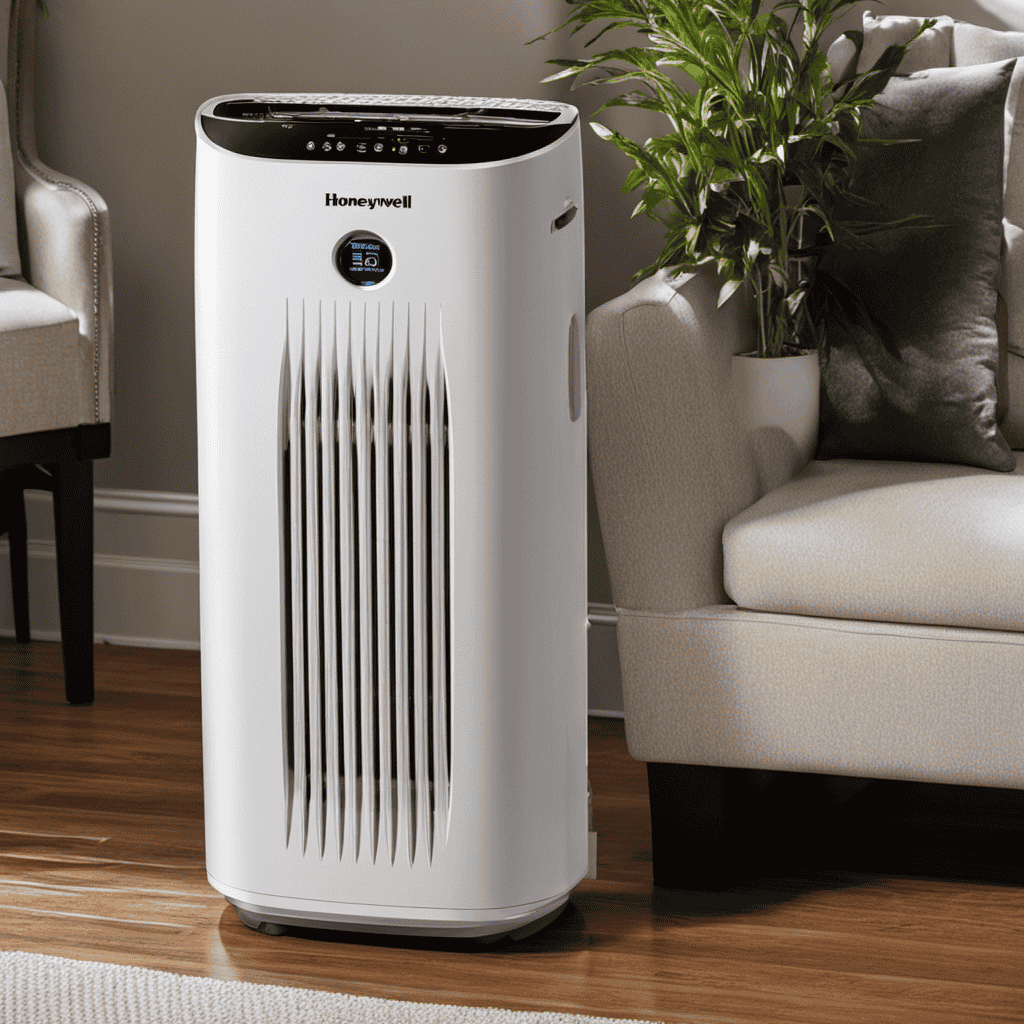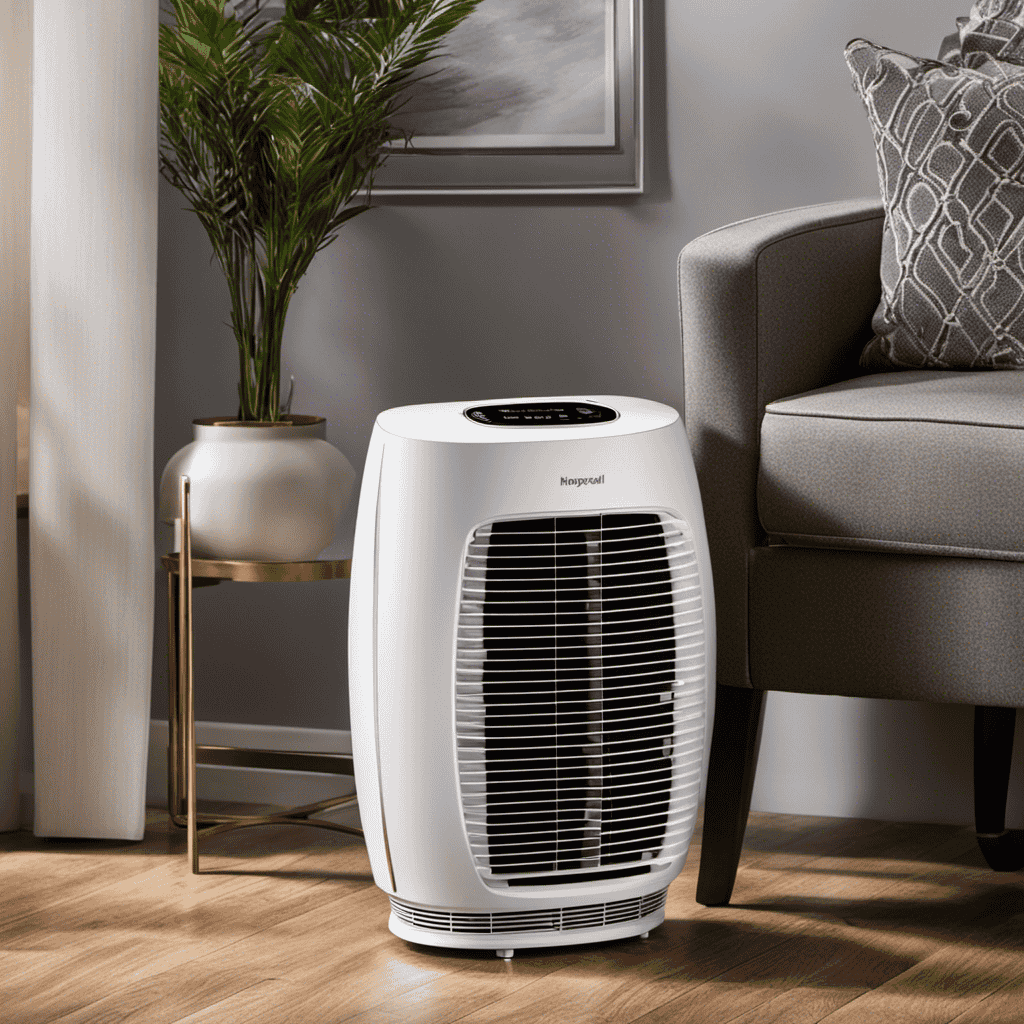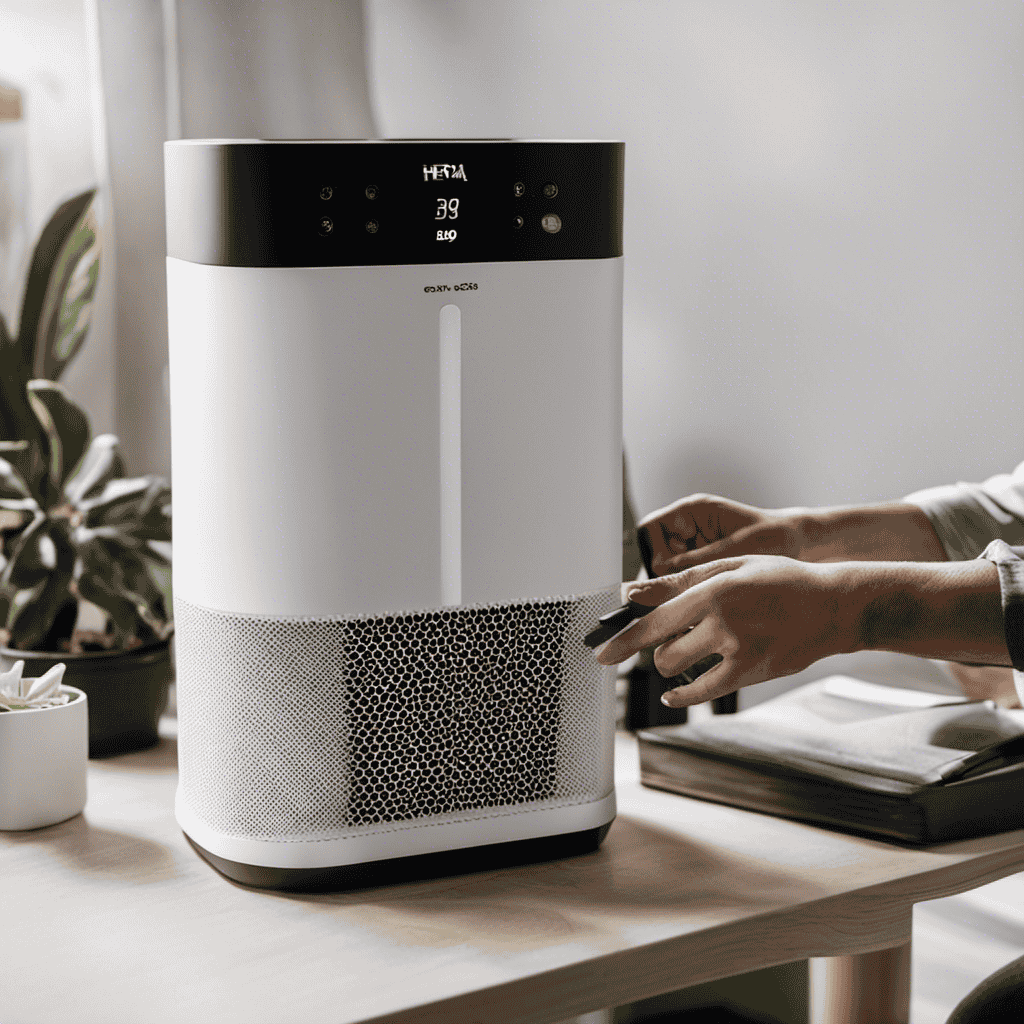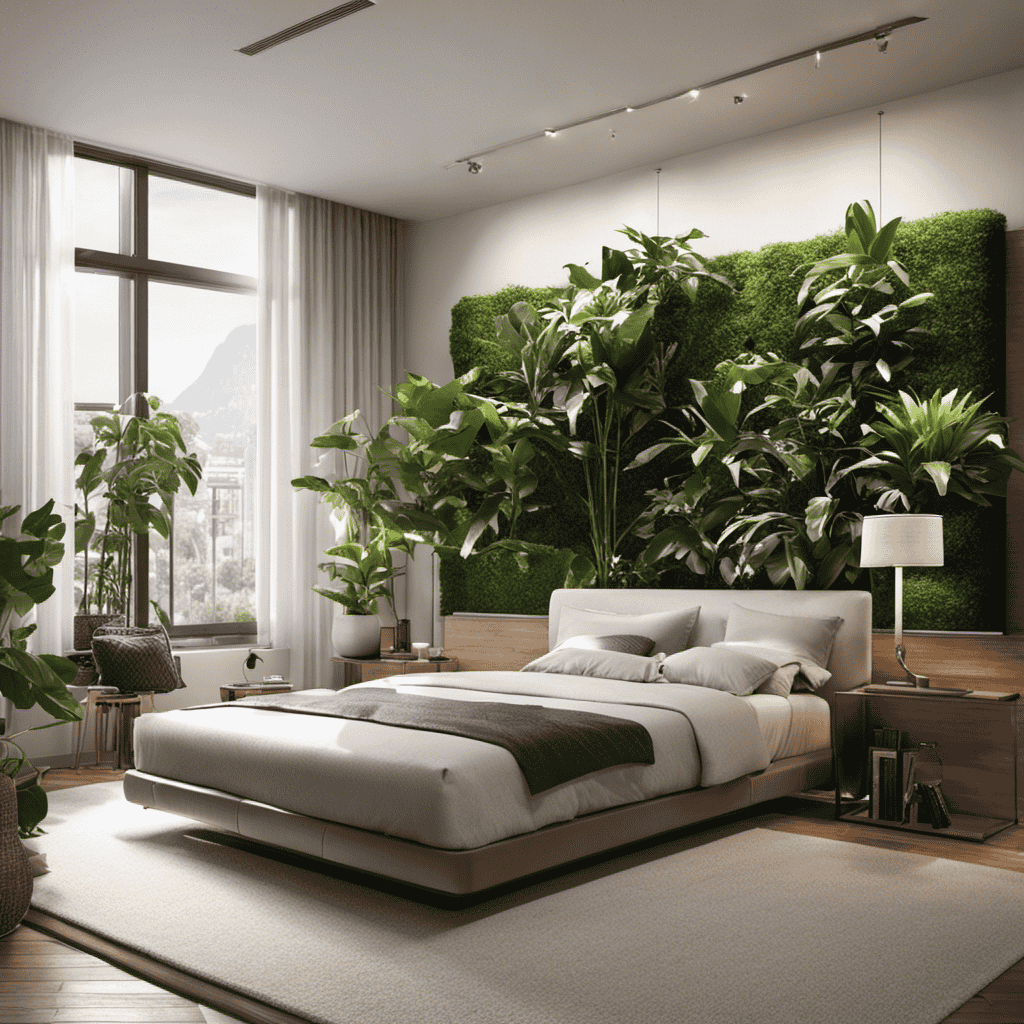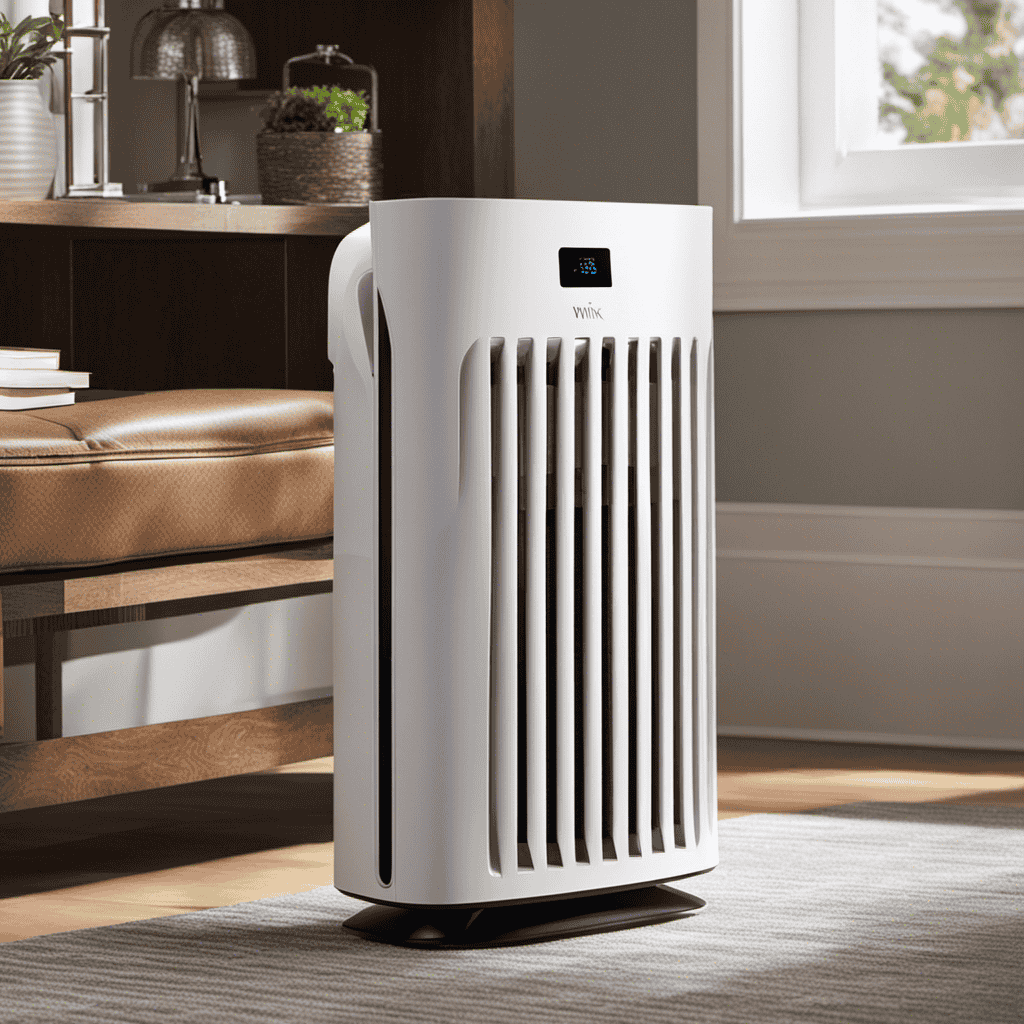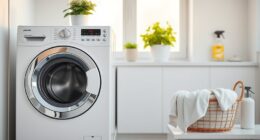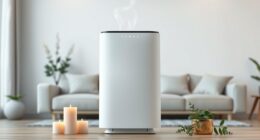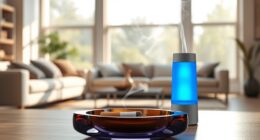As the proprietor of the Honeywell True HEPA Air Purifier 50150-N, I continually search for methods to enhance its efficiency.
One crucial aspect that ensures its efficiency is the timely change of the filter.
In this article, I will delve into the recommended frequency for filter replacement, factors that affect its lifespan, signs indicating when it needs to be replaced, and tips for extending its longevity.
By understanding these key points, we can maintain clean and healthy air in our homes.
Key Takeaways
- Timely filter replacement ensures efficiency of the Honeywell True Hepa Air Purifier 50150-N.
- Regular filter changes improve air quality and reduce allergens and dust.
- Clogged filters restrict airflow and strain the motor, leading to decreased performance.
- Factors such as air quality, frequency of use, and additional pollutants can affect the lifespan of the filter.
Filter Lifespan and Maintenance
The filter on the Honeywell True HEPA Air Purifier 50150-N typically needs to be changed every 3-5 years, depending on usage. Optimal filter maintenance is crucial for ensuring the longevity and effectiveness of the air purifier.
Regularly changing the filter helps to maintain clean and fresh air in your home or office environment. The benefits of clean air cannot be overstated. It improves the quality of life by reducing allergens, dust, pet dander, and other airborne particles that can trigger allergies or respiratory issues.
Clean air also promotes better sleep, enhances concentration, and boosts overall well-being. By following the recommended filter change schedule, you can ensure that your Honeywell True HEPA Air Purifier 50150-N continues to provide you with the best air quality possible.
Recommended Frequency for Filter Replacement
In my experience as an air quality specialist, determining the optimal filter change frequency is crucial for maintaining the efficiency of an air purifier.
Several factors can affect the lifespan of a filter, including the air quality in the environment, the frequency of use, and the type of pollutants present.
Optimal Filter Change Frequency
You should check how often to change the filter on your Honeywell True HEPA Air Purifier 50150-N for optimal performance.
The frequency of filter replacement is crucial in maintaining the efficiency of your air purifier and ensuring clean and healthy air in your home.
One important consideration is the filter replacement cost. While it may seem tempting to stretch the lifespan of the filter to save money, using a clogged or dirty filter can significantly impact the air purification efficiency of the device.
A clogged filter restricts airflow, reducing its ability to capture and remove airborne particles effectively. This not only reduces the overall performance of the air purifier but also puts additional strain on the motor, potentially shortening the lifespan of the device.
Therefore, it is essential to regularly check and change the filter to ensure optimal performance and efficient air purification.
Now, let’s explore the factors that can affect the lifespan of the filter.
Factors Affecting Filter Lifespan
To maximize the lifespan of your air purifier’s filter, it’s important to consider various factors that can impact its efficiency. These factors include the quality of the air being filtered, the frequency of use, the maintenance of the filter, and the presence of any additional air pollutants.
| Factors | Impact on Filter Lifespan |
|---|---|
| Air Quality | High levels of pollutants can clog the filter faster, reducing its effectiveness. Regular cleaning or replacement may be necessary. |
| Frequency of Use | The more frequently the air purifier is used, the more often the filter will need to be replaced. |
| Maintenance | Regular maintenance, such as cleaning and dusting the filter, can help extend its lifespan. |
| Additional Air Pollutants | If there are additional sources of air pollutants in the environment, such as smoking or pet dander, the filter may need to be replaced more frequently. |
Factors Affecting Filter Lifespan
When considering the factors that affect the lifespan of air purifier filters, two key points come to mind.
The first is environmental conditions. Factors such as the presence of dust, allergens, and pet dander can lead to a faster accumulation of particles in the filter. Over time, this can reduce the filter’s effectiveness.
The second point is the frequency of air pollution. In areas with high levels of air pollution, whether it’s due to industrial activities or high traffic, the filter will be exposed to higher levels of pollutants on a regular basis. This can also impact the filter’s lifespan.
Environmental Conditions and Lifespan
Make sure that the environmental conditions in your home are optimal for the lifespan of your Honeywell True HEPA Air Purifier 50150-N. To ensure that the air quality is at its best and the filter efficiency is maximized, consider the following:
- Keep your home clean and dust-free to reduce the workload on the air purifier.
- Control humidity levels to prevent mold and mildew growth, which can clog the filter.
- Avoid smoking indoors as it can significantly deteriorate air quality and decrease filter efficiency.
Maintaining these environmental conditions will not only prolong the lifespan of your air purifier but also ensure that it effectively removes airborne pollutants, improving the overall air quality in your home.
Now that we understand the importance of environmental conditions, let’s dive into the frequency of air pollution and how it affects the filter lifespan.
Frequency of Air Pollution
Understanding the frequency of air pollution is crucial in determining the lifespan of your air purifier’s filter. Air pollution, caused by various sources such as industrial emissions, vehicle exhaust, and indoor pollutants, can have detrimental effects on our health. Particles like dust, pollen, and smoke can infiltrate our homes, leading to respiratory issues and allergies.
That’s why it’s important to take preventive measures to reduce air pollution, such as using air purifiers. However, the effectiveness of air purifiers depends on the frequency of air pollution in your area. If you live in an area with high levels of pollution, your air purifier’s filter may need to be replaced more frequently. Understanding the frequency of air pollution is essential for maintaining clean indoor air and ensuring the longevity of your air purifier’s filter.
Now that we understand the importance of air pollution frequency, it’s crucial to identify the signs that indicate filter replacement.
Signs That Indicate Filter Replacement
You’ll know it’s time to change the filter in your Honeywell True HEPA air purifier 50150-n when you notice reduced airflow or a buildup of dust on the filter. Regular filter changes are crucial for maintaining the efficiency and effectiveness of your air purifier.
Here are some key filter replacement indicators and the benefits of regular filter changes:
-
Reduced airflow: When your filter is clogged with dust and particles, it restricts the airflow, making the purifier less effective in cleaning the air.
-
Buildup of dust on the filter: A visible layer of dust on the filter indicates that it has reached its maximum capacity and needs to be replaced.
Benefits of regular filter changes:
-
Improved air quality: A clean filter ensures that harmful particles and allergens are efficiently removed from the air, providing you with cleaner and healthier indoor air.
-
Enhanced performance: A clean filter allows the air purifier to work at its full potential, effectively capturing pollutants and maintaining optimal airflow.
-
Prolonged lifespan: Regular filter changes prevent strain on the motor and other components of the air purifier, leading to a longer lifespan and reliable performance.
Remember to check your air purifier’s manual for specific guidelines on filter replacement frequency.
Extending the Lifespan of Your Filter
Regular filter changes can significantly extend the lifespan of your air purifier’s filter. By following some simple maintenance tips, you can ensure that your filter lasts longer and provides you with clean and fresh air for a prolonged period of time.
Firstly, it’s important to check the manufacturer’s recommendations for filter replacement frequency. This will give you a guideline on how often you should change the filter. Additionally, it’s crucial to regularly clean the pre-filter to prevent dirt and debris from clogging the main filter.
Another tip to increase the longevity of your filter is to keep your air purifier in a clean environment. Avoid placing it near dusty areas or where there is a lot of pet hair. This will reduce the amount of particles that the filter has to capture, prolonging its lifespan.
Lastly, regularly vacuuming the external part of the air purifier can help remove any accumulated dust, ensuring optimal performance and increasing the overall lifespan of the filter.
Proper Filter Care and Cleaning
To increase the longevity of your filter, it’s important to regularly clean the pre-filter and keep your air purifier in a clean environment. Proper cleaning techniques can help ensure optimal performance and extend the lifespan of your filter.
Here are some common mistakes to avoid:
- Avoid using harsh chemicals or cleaning agents on the filter, as this can damage the filter material.
- Don’t neglect cleaning the pre-filter, as it can become clogged with larger particles and reduce the efficiency of the main filter.
- Avoid excessive cleaning or washing of the filter, as this can also damage the filter material and decrease its effectiveness.
By following these cleaning techniques and avoiding common mistakes, you can maximize the lifespan of your filter and maintain optimal air purification.
Now, let’s explore how to choose the right replacement filter for your Honeywell True HEPA Air Purifier 50150-N.
How to Choose the Right Replacement Filter
When choosing a replacement filter, it’s important to consider the compatibility and size requirements of your specific air purifier model. The right filter will ensure optimal performance and clean air in your space.
To begin, assess the air purifier features and specifications. Look for a filter that meets your needs in terms of particle removal efficiency, such as a True HEPA filter for capturing 99.97% of particles as small as 0.3 microns.
Additionally, consider the cost analysis of replacement filters. Some filters may have a higher initial cost but offer longer lifespan or better efficiency, making them more cost-effective in the long run.
Take into account the recommended filter replacement frequency and cost to maintain clean air in your home or office.
Frequently Asked Questions
Can I Use Any Brand of Replacement Filter for My Honeywell True Hepa Air Purifier 50150-N?
Yes, you can use alternative brands of replacement filters for your Honeywell True Hepa Air Purifier 50150-N. However, it’s important to ensure compatibility and effectiveness by checking the specifications and reviews before purchasing.
Is It Necessary to Replace the Pre-Filter Along With the HEPA Filter?
No, it is not necessary to replace the pre-filter along with the HEPA filter. The pre-filter replacement frequency may vary depending on usage. It is important to check the compatibility of the pre-filter with other Honeywell air purifiers.
Are There Any Specific Cleaning Products or Solutions Recommended for Cleaning the Filter?
When it comes to cleaning the filter, it is important to use proper cleaning techniques and avoid harsh chemicals. While there are alternative cleaning solutions available, it is best to follow the manufacturer’s recommendations for optimal results.
Can I Wash the Filter Instead of Replacing It?
Yes, you can wash the filter instead of replacing it. Washing the filter allows for reuse and helps maintain its effectiveness. The benefits include cost savings and reducing waste. However, follow manufacturer instructions and ensure proper drying before reinstallation.
Are There Any Warranties or Guarantees on the Lifespan of the Filter?
There aren’t any alternative filters compatible with the Honeywell True Hepa Air Purifier 50150-N. The lifespan of the HEPA filter in the 50150-N model depends on factors like usage and air quality.
Conclusion
In conclusion, maintaining and replacing the filter of the Honeywell True HEPA Air Purifier 50150-N is crucial for optimal performance and clean air quality.
While some may argue that the frequency of filter replacement can be costly, it is important to consider the long-term benefits of breathing in clean and purified air.
The evidence-based recommendations provided in this article will help you extend the lifespan of your filter and ensure its effectiveness.
By following proper care and cleaning techniques, you can enjoy the benefits of a healthy and pollutant-free environment.
